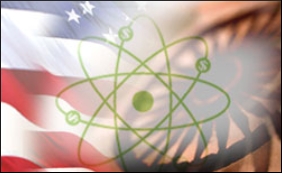|

|
NSG says yes, India gets global nuclear passport
|
|

|
|
| Top Stories |
 |
|
|
|
Staff Reporter | 06 Sep, 2008
In a historic moment that ended more than three decades of nuclear isolation for India, the 45-nation Nuclear Suppliers Group Saturday rewrote their guidelines to resume global nuclear trade with New Delhi.
The NSG's decision to grant India a clean waiver from its existing rules, which forbid nuclear trade with a country which has not signed the Nuclear Non-Proliferation Treaty (NPT), came Saturday afternoon after three days of intense diplomacy by the US and India in the nuclear cartel that controls the global flow of nuclear fuel and technologies.
The nuclear deal is now headed for the US Congress, which meets September 8 to discuss an approval for the 123 India-US bilateral agreement which will bring the landmark nuclear deal to its closure over three years after it was first conceptualised.
The two countries are expected to formally sign the bilateral pact, likely when Manmohan Singh goes to Washington towards the end of September, that will restore nuclear trade with the US after a gap of 34 years.
Economic sanctions were imposed by the US and the rest of the world when India first conducted its nuclear test in 1974.
The NSG's waiver also frees India to sign bilateral civil nuclear cooperation agreements with France and Russia, leading advocates of the nuclear deal, who also used their clout to win over sceptics in the nuclear cartel.
Prime Minister Manmohan Singh is set to sign bilateral civil nuclear cooperation with France when he goes to Paris for bilateral talks Sep 30 after attending the India-EU summit in the coastal resort town of Marseilles.
The bilateral civil nuclear cooperation agreement with Russia, which was finalized last year and iniatialled early this year, will be signed when Russian President Dmitry Medvedev comes to New Delhi in November this year.
The NSG had extended their two-day meeting in Vienna Friday by another day after marathon negotiations that went well past midnight failed to bring sceptics around to back the nuclear deal.
Some sceptics in the nuclear club like Austria, Ireland and New Zealand, known for their hardline non-proliferation stance, resisted till the last minute appeals by the US to accommodate India inside the global non-proliferation tent.
Austria and New Zealand, which were also supported by Norway, Switzerland, the Netherlands and Switzerland, had insisted that provisions be included in the draft on the proposed waiver that will allow NSG to terminate nuclear business with India if it conducted another test.
India's External Affairs Minister Pranab Mukherjee's statement Thursday re-affirming New Delhi's commitment to a "voluntary moratorium" on future testing boosted India's case in the NSG and was praised as "very significant" by NSG.
"This is a very significant statement which was discussed by members of the NSG and praised and welcomed by those in attendance," US Assistant Secretary for Arms Control and International Security Affairs John Rood told reporters at the end of the of Friday's morning session of the NSG.
He added: "On the basis of this a positive momentum has been generated in the discussion and as I said before we remain committed to achieving the objective and remain optimistic that we can achieve that."
"We remain committed to a voluntary, unilateral moratorium on nuclear testing. We do not subscribe to any arms race, including a nuclear arms race," Mukherjee said in his statement issued in New Delhi before the NSG met for the second day in Vienna.
The minister's statement and the existing guideline in the NSG that provides for termination of commerce with a country that violates the rules and conducts a test were highlighted during Friday's discussions among the members to convince the sceptics who are opposed to a "clean waiver" for India.
However, in the end the US' arguments about the merits of accommodating India, the world's most populous democracy and a rising economy, in the global non-proliferation order prevailed. Washington also managed to convince sceptics about India's impeccable record in non-proliferation and how making an exception for India will be a net gain for the global non-proliferation regime.
|
|
|
| |
|
|
|
|
|
|
|
|
|
|
|
|
|
|
| |
| Customs Exchange Rates |
| Currency |
Import |
Export |
US Dollar
|
66.20
|
64.50 |
UK Pound
|
87.50
|
84.65 |
Euro
|
78.25
|
75.65 |
| Japanese
Yen |
58.85 |
56.85 |
| As on 13 Aug, 2022 |
|
|
| Daily Poll |
 |
 |
| PM Modi's recent US visit to redefine India-US bilateral relations |
|
|
|
|
|
| Commented Stories |
 |
|
|
|
|
|
| |
|